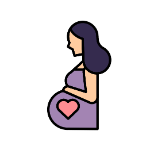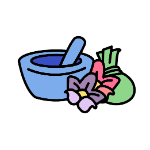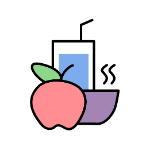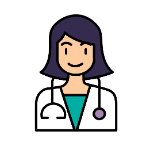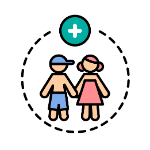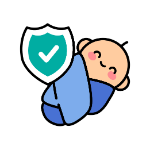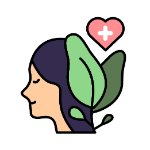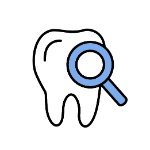
Foods That You Should Avoid During Pregnancy
(Image credits to Kangaroo Care)
Fortunately, there's more you can eat than there isn't. All you need to do now is learn how to manage it. To stay healthy, you'll need to pay close attention to what you eat and drink. Certain foods should be taken only on rare occasions, while others should be avoided entirely. While pregnant, there are 15 foods and beverages to avoid or limit during pregnancy.
#1 Soft Cheese
Mold-ripened soft cheeses like brie, camembert, and chevre (a type of goat's cheese), as well as others with a similar rind, should be avoided. Soft blue-veined cheeses, such as Danish blue or gorgonzola, should also be avoided. These are manufactured with mold and may contain listeria, a germ that can damage an unborn baby.
(Image credits to Canva)
Although listeria infection (listeriosis) is not very common, extra measures should be taken during pregnancy since even a minor form of the sickness in a pregnant woman can result in miscarriage, stillbirth, or serious illness in the newborn baby.
#2 Undercooked Meat
Now is the time you order all your steaks and meats fully cooked. Undercooked meat can contain toxoplasma and other harmful bacteria. So, when you go out for dining out, make sure your meat is steaming hot and perfectly cooked.
(Image credits to Canva)
If you believe you were in danger, talk to your doctor or obstetrician about it. Toxoplasmosis treatment is available if you become infected while pregnant. After preparing raw meat, thoroughly wash all surfaces and utensils. It's also crucial to remember to wash and dry your hands after processing raw meat. This will help in reducing the risk of hazardous bacteria such as salmonella, campylobacter, and E. coli. to cause food poisoning.
#3 Juice from Outside
Freshly squeezed juice sold in restaurants, juice bars, and farm stands may not have been pasteurized to protect against hazardous pathogens such as salmonella and E. coli. In certain stores, raw, unpasteurized juice is sold in the refrigerated section; look for the required warning notice and avoid it if necessary. Juice in boxes and bottles on your supermarket shelf is safe to drink.
#4 Sushi
Sorry, sushi lovers, but it's time to take a 9-month break from this delicacy. Raw seafood may be a source of harmful parasites and germs, despite the fact that it is an excellent source of protein. Avoid cold seafood, such as raw oysters, sashimi, and sushi, as well as smoked ready-to-eat seafood and cooked ready-to-eat prawns, as they are more likely to have listeria.
(Image credits to Canva)
Sushi that is completely cooked or vegetarian, such as the following types, is the safest to eat:
• Cooked seafood, for example fully cooked eel (unagi) or shrimp (Ebi)
• Vegetables, for example, cucumber (kappa) maki
• Avocado — for example, California roll
• Fully cooked egg
#5 Raw Eggs
Salmonella is a bacterium that can be found in raw eggs. Fever, nausea, vomiting, stomach cramps, and diarrhea are all symptoms of salmonella infections. In rare circumstances, the infection might induce uterine cramping, which can lead to preterm delivery or stillbirth.
The majority of commercial raw egg products are manufactured with pasteurized eggs and are safe to eat. However, you should always double-check the label. To be on the safe side, always thoroughly boil eggs or use pasteurized eggs. Save those super runny yolks and homemade mayonnaise until after the baby is born.
#6 Fresh Pre-Stuffed Poultry
When you're short on time, a pre-stuffed turkey or chicken is a wonderful option. The juice from fresh, raw poultry, on the other hand, might combine with the stuffing and produce a perfect environment for germs to grow. Cooking offers some protection, but pregnancy makes it more difficult to fight diseases. Purchasing frozen pre-stuffed poultry is a safe alternative. Make sure you cook it straight from the freezer, rather than letting it defrost first. The temperature of the thigh meat should reach 180 degrees Fahrenheit.
#7 Fish With Mercury
(Image credits to Canva)
Fish is excellent for you and your kid, but make sure you consume the right kind of fish. Methylmercury is high in swordfish, tilefish, king mackerel, and shark. This metal is potentially dangerous to your child. You may consume up to 12 ounces of seafood each week safely, so pick mercury-free fish like catfish, salmon, cod, and canned light tuna. Limit yourself to 6 ounces of albacore (white) tuna each week if you enjoy it. Before using fish oil or any other supplements while pregnant, consult your doctor.
#8 Deli Meats
Listeria, unlike many other food-borne bacteria, can thrive in fridge temperatures. As a result, when you're pregnant, you should avoid perishable, ready-to-eat meats like cold cuts and hot dogs. These meals could be made safe by heating them until they are piping hot and then eating them soon away.
#9 Unwashed Fruits and Veggies
(Image credits to Canva)
It's time to eat a lot of fruits and vegetables! Just be sure to properly clean them under running water. Toxoplasma parasites may thrive on unwashed fruits and vegetables. It produces toxoplasmosis, a serious condition that can be fatal to your kid. When washing produce, avoid using soap. Scrub the surface with a tiny vegetable brush instead. Any injured areas should be cut away since they may house germs. Before slicing cantaloupe, clean and dry it to avoid listeria germs.
#10 Raw Sprouts
Raw sprouts, such as alfalfa, clover, and radish, should not be eaten. Bacteria can enter the seeds before the sprouts appear, and these germs are extremely hard to wash away. Check sandwiches at the deli to be sure they don't include raw sprouts. Cook sprouts thoroughly at home to kill any germs.
#11 Smoked Seafood
(Image credits to Canva)
It's advisable to forego the lox on your morning bagel when you're pregnant. Refrigerated smoked seafood, like ready-to-eat meats, is susceptible to listeria. Smoked salmon (commonly branded nova or lox), as well as smoked trout, whitefish, cod, tuna, and mackerel, fall under this category. Smoked fish is okay to use in a cooked dish like a casserole.
#12 Raw Shellfish
One of the most common causes of seafood disease is raw shellfish. Parasites and bacteria that aren't often seen in cooked fish are among the culprits. So pass on the half-shell oysters. Shellfish is safe to eat during pregnancy as long as it is fully cooked. Oysters, clams, and mussels should be cooked until the shells open. Throw away those that don't open.
#13 Unpasteurized Milk
(Image credits to Canva)
Have you ever dreamt of going to a farm and tasting fresh milk from a cow? Wait a minute. Milk that has been collected just now and has not yet been pasteurized, which protects it against listeria. This is potentially risky for both you and your child. If the label reads "pasteurized," buy milk, cheese, or dairy products from a local farm.
#14 Caffeine
You may be one of the millions of people who like a cup of coffee, tea, soft drink, or cocoa every day. When it comes to our coffee addiction, you're not alone. According to the American College of Obstetricians and Gynecologists, pregnant women should limit their caffeine intake to less than 200 milligrams (mg) per day (ACOG).
(Image credits to Credits)
Caffeine is absorbed quickly and easily passed into the placenta. Because newborns and their placentas lack the key enzyme required for caffeine metabolism, excessive quantities can develop. Caffeine use during pregnancy has been proven to limit fetal development and raise the chance of delivering a baby with low birth weight.
#15 Alcohol
You're probably aware that binge drinking while pregnant can result in catastrophic birth problems. You might not realize it, but even modest amounts of alcohol can be hazardous. It's advisable to avoid all types of alcohol during pregnancy because no quantity of drinking has been proved to be safe. This includes alcoholic beverages such as wine, beer, and coolers, as well as traditional eggnog, which contains both alcohol and uncooked eggs.
We hope you got a clear insight from our blog foods that you should avoid during pregnancy. When you're pregnant, it's critical to stay away from foods and beverages that might harm you or your unborn. Although most foods and drinks are absolutely healthy to consume, some should be avoided, such as raw fish, unpasteurized dairy, alcohol, and high mercury seafood. In order to maintain a healthy pregnancy, several foods and beverages, such as coffee and meals high in added sugar, should be controlled.
If you want to learn more about what foods you should eat during pregnancy, check out this article- List Of 20 Types Of Foods That Will Help To Develop Baby's Brain In The Womb or you can also read- 5 Best Pregnancy Yoga Poses To Relieve Lower Back Pain And Upper Back Pain.
